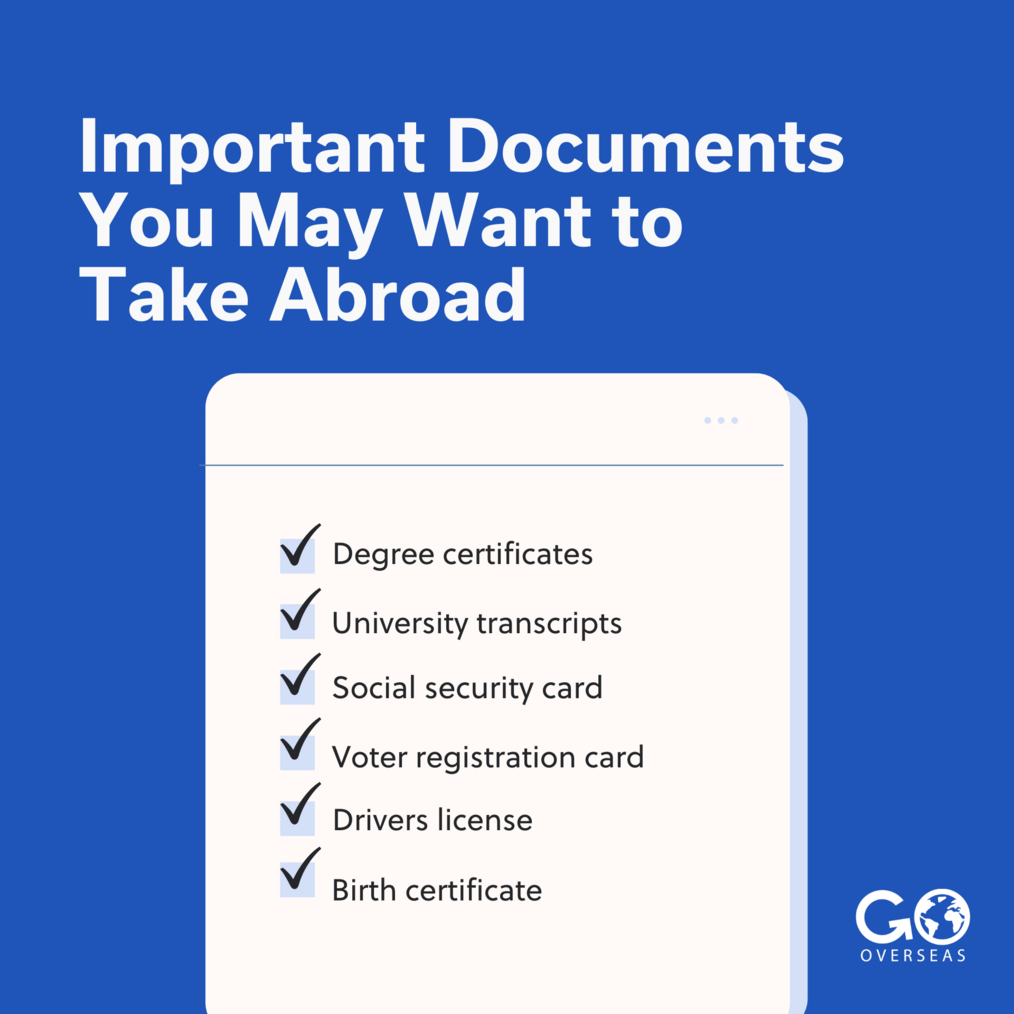
How to Move Abroad in 2025: Live Overseas as an Expat
Planning your move to another country but not sure how to get started? From finding an apartment overseas to buying your plane ticket, here's our ultimate guide to moving abroad.
If moving to another country has been on your mind, you’re not alone. The Association of Americans Resident Overseas estimates that as of 2023, at least 5.4 million US citizens are living abroad.
Whatever your reason for moving overseas, it’s true that the process takes proper research and preparation. Don’t let that deter you, though – relocating to another country is well worth the effort. Immersing yourself in another culture, learning a new language, and meeting new people are a few of the benefits that await you.
We’ve put together the ultimate guide with tips for moving abroad to help you navigate the most important steps, from ways to do it to what to do when you get there.
Read more: Should You Move Abroad? 10 Important Questions to Ask Yourself
Potential ways to move abroad

You may have wondered how to move abroad because things like visas and finding a job make it seem like it would be nearly impossible to do. While there is a lot of red tape, there are several ways that someone can move to another country and some are easier than others. It all depends on your personal situation and what works best for you.
Read more: The Best Countries to Work Abroad
Find a job abroad (expat)
If you are a skilled worker, it’s possible to apply for jobs abroad and get visa sponsorship from an employer. Common fields where this is possible are tech, medicine, teaching, and engineering. Some countries may offer general work permits that allow you to search for work within the country while others need you to have a job offer secured before leaving.
Check out the GO Jobs Board for opportunities abroad!
Read more:
Work remotely (digital nomad)
Countries across the globe are beginning to offer digital nomad visas. These visas are for remote workers who meet a certain income requirement and generally don’t plan to stay more than a year. They’re a great option if your employer has given you the green light to work from anywhere in the world, or if you’re a freelancer who manages your own remote clients.
Read more:
Teach abroad
Teaching English abroad has long been a fantastic option for working and living legally abroad. If you don't have a teaching degree but are passionate about teaching English as a foreign language to kids and teens, just get TEFL certified and go!
Programs in popular countries like China, South Korea, Japan and Thailand will provide assistance to secure work visas before setting off. Great pay and benefits in these countries paired with a more affordable cost of living than in the US mean your salary can go far – pay off student loans or travel like crazy!
Find teaching programs abroad!
Read more:
Graduate school (student visa to work permit)
If you’re already considering getting a master’s or PhD and also want to live abroad, this could be a great option. Many countries allow students of postgrad courses to stay and seek work after graduation. For example, Ireland has a graduate visa that gives master’s students two years to work legally in the country. Usually, after that time, your employer can continue to sponsor you, so you can switch from a graduate visa to a work permit.
A graduate degree abroad might even cost you considerably less than studying in the US. Germany is one of the few countries in the world to offer free university tuition to international students.
Check out overseas graduate school programs to learn more about your options.
Read more:
1. Research the country

Whether you enjoy the research phase or not, a few Google searches about your new home will go a long way to making the transition smoother. Not only will it prepare you for packing (weather!) and budgeting (cost of living!), it can help you understand the people and society you are joining.
We suggest checking out the following:
Weather
You may know the general weather trends of where you’ll be going – you may have even picked your destination because of them! It’s still good to look into things like rainfall, humidity, and extreme weather events, though. This will help you when you start packing and could save precious space in your suitcase.
Customs & culture
What holidays does your country observe? Is it particularly religious or mostly secular? Customs and culture influence how people interact and tend to govern social codes of conduct. For instance, in some Muslim-majority cultures, there are often rules and norms for interactions between men and women. It’s important to arrive in your new country as respectfully as possible.
Read more: How to Deal with Culture Shock While Abroad
Laws
Did you know that eating or drinking on trains is illegal in Singapore? Even taking a sip of water can cost you up to $500 in fines. Laws are different all around the world and ignorance of the laws in your new country likely won’t help you avoid fines or even arrest in some cases. Something that’s generally overlooked in your own country, like jaywalking, can be a big deal somewhere else.
History and politics
Although some countries have more complex histories than others, there are important things to know about each one. Certain topics may be taboo or uncomfortable to discuss, such as the Spanish Civil War and the dictatorship of Francisco Franco in Spain, and knowing them will help you avoid causing upset to someone accidentally.
Cost of living
Will you be able to splurge on a weekly dinner out or an apartment with a pool? Cost of living estimate sites like Numbeo can give you a good idea of what things like food, entertainment, and housing will run you before you get this. This is key when planning your budget and envisioning the type of lifestyle you can afford.
2. Manage your finances
As a continuation of your research from step one, cost of living estimates will be the basis for beginning to manage your finances.
Calculate costs associated with moving
It’s easy to overlook all of the costs that will add up during your move. Every time I move I try to overestimate the amount of money I’ll need. In the end, it’s better to have a budget surplus than be scrambling to cover what you need.
Some possible costs that may pop up can include:
- Truck rental for moving furniture and household items to friend’s/family’s house, donation point, or storage unit
- Passport (if you don’t have one already) and visa fees
- Plane ticket
- Temporary accommodation (if not provided by employer) while you search for a permanent place to live
- Taxi or van from the airport to temporary or permanent accommodation
- Deposit and first month’s rent (some countries may ask for a larger deposit of 2+ months or more rent coverage)
- Start-up costs for furnishing and/or decorating your apartment, food, transportation, etc. before your first or next paycheck
Create a budget and track your spending
Using your cost of living numbers from step 1, you can set up a monthly budget. This budget can be as simple as a Word document or Excel spreadsheet but you can also take it a step further and use a spending tracking app. Many apps are free and can be linked to your bank account to help you understand the funds that are coming and going. Don’t forget to include any expenses back home like student loan or credit card payments or storage unit fees.
Read more: How to Budget for Study Abroad
3. Start learning the language

Even with the privilege of English being spoken in many places worldwide as a second language, learning a little bit of the local language will help you integrate into your new country. Whether you enroll in a classroom course or study online, there are free and affordable options.
Read more: Helpful Language Phrases to Learn Before You Travel
Free apps (with paid premium subscriptions)
Apps are a great way to learn a language, especially on the go during your daily train commute or while you wait in line at the post office. Many language learning apps are free but some have limited access to features unless you pay for a monthly or yearly subscription. Here are some of our language learning app picks:
- Drops: gamified learning uses beautiful graphics and interface to teach vocabularly and limited verbs.
- Duolingo: Duo the owl guides you through vocabulary and sentence building through games and stories.
- Babbel: a holistic approach to learning that allows you to practice speaking, reading, writing, and listening using podcasts, conversations, and games.
- Busuu: get written or recorded audio feedback from other learners who are native speakers of your target language.
Affordable in-person and online options
More structured learning is available if you want to dig deeper into your new language. Local in-person options, as well as online options, give you a supported, guided experience which may be preferable for some learners.
- Local community colleges or universities offering adult enrichment language classes
- Official or nonprofit language organizations such as Instituto Cervantes for Spanish, Alliance Française for French, or Goethe Institut for German
- Private online language schools
4. Gather important documents
Aside from your passport, you’ll need several important documents for your visa appointment. However, there are also other documents you may want to take with you overseas. Once you’re abroad, any number of scenarios could arise that would require additional documentation, and having the most crucial with you can save time and a potential headache.

5. Apply for your visa
The kind of visa you apply for depends on your reason for moving abroad. Visas for English teachers and other workers are usually sponsored by the employer. Digital nomads are able to apply for digital nomad visas in eligible countries. If you’re moving overseas to undertake graduate study, you’ll generally need to apply for a student visa before you go.
Most visa applications require:
- Passport-sized photos
- Valid passport
- Completed application form
- Criminal background check
- Medical form completed by a physician
- Proof of health insurance coverage
- Proof of savings or income
- Application fee
Of course, check the specific requirements for the country you will be traveling to. The local consulate is your best resource for up-to-date information.
Read more: How to Get a Work Visa for Teaching English Abroad
6. Decide what to do with your things

Unless it’s totally necessary to bring the whole apartment, moving abroad with only a few suitcases is the most ideal and hassle-free way to go. If you need to take more than that with you though, there are options for you, too.
Furniture and other belongings
After you’ve set aside what you’ll be bringing with you in your suitcases, you’ll need to decide what to do with the rest. Here are some common ways to take care of your furniture and other belongings:
- Friends and/or family: if you have people willing to store your stuff for you, this is a great way to save some money. You may keep all of your stuff in one place or break it up among family and friends.
- Sell or donate: not too attached to that IKEA furniture from college? Think about selling it on websites like Craigslist or donating to your local Goodwill or Salvation Army.
- Storage unit: a storage unit can be rented either short-term or long-term and can store either a few items or an entire houseful of belongings. Climate-controlled units tend to be more expensive but can save your stuff from damage such as mold.
- Ship abroad: while not the most cost-effective option, it is possible to ship larger items like furniture, bikes, or heavier bags overseas. This can be done by freight either on a ship or an airplane.
Pets
We know pets aren’t belongings but they are still a very important part of your move abroad! If you’re moving abroad short-term, you can have a willing family member or friend take care of your pet. My parents watched my poodle mix Louie the year I was in graduate school in Ireland. After graduation, I flew home to bring him over to Europe with me to live.
If your move is more permanent or you can’t bear to be away from your furbaby for even a few months, it’s not too difficult to move abroad with a pet. You’ll need to find a USDA accredited veterinarian in your area to fill out pet export paperwork.
To fly to your destination, where your pet travels depends on their species and size (cabin vs. hold). However, keep in mind that countries designated as rabies-free often do not allow pets to fly on commercial flights with you – they may need to be flown freight and may be required to undergo a quarantine period at your expense.
7. Buy your ticket
It’s best practice to wait to buy your ticket until after your visa is approved. Post-COVID processing times are unpredictable and often delayed for many countries.
Getting the best deal on plane tickets is a bit of an art and we recommend the following tips:
- Book early, but not too early: 2-3 months before departure is usually the cheapest but this depends on your visa and when you need to enter the country
- Be flexible with your departure date: sometimes flying a day before or after your ideal date can get you big savings
- Consider flights with stopovers rather than direct flights: layovers may be annoying but they can save you some cash.
- Although it’s important to consider that if your flight doesn’t include luggage transfers, direct might be best for a move!
- Sometimes roundtrip tickets are cheaper than one-way!
Two great flight search engines are Skyscanner and Google Flights.
You may not have a lot of flexibility with your departure depending on your circumstances. If a job requires you to get abroad ASAP, you probably won’t be able to be picky.
Explore Go Overseas’ nomad essentials
Here at Go Overseas, we love making travel easier! To support your globetrotting lifestyle, we've partnered with a range of major companies to provide you with discounts on things like travel insurance, accommodation, and more. Check out our nomad essentials to stock up on everything you need!
Make your move abroad

It may seem like a long road from start to finish but the time will fly by and you’ll find yourself wondering how the days slipped away so quickly. As long as you stay organized and focused, it should be smooth sailing. Next thing you know, you’ll be settled in your new home country thinking back on the best decision you ever made!
Read up on how to move to a foreign country with GO!






